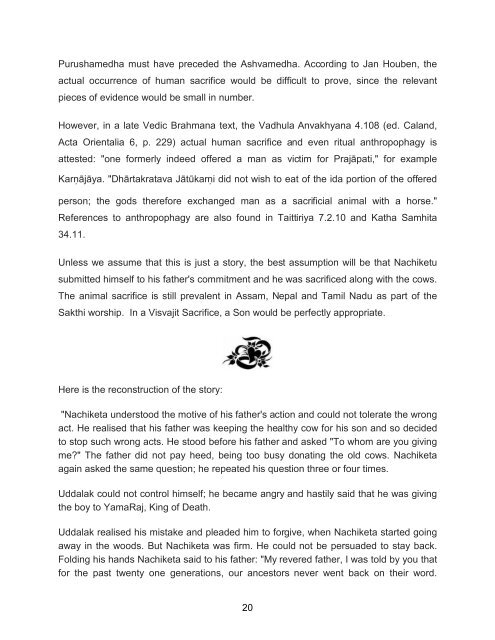KathaUpanishad
You also want an ePaper? Increase the reach of your titles
YUMPU automatically turns print PDFs into web optimized ePapers that Google loves.
Purushamedha must have preceded the Ashvamedha. According to Jan Houben, the<br />
actual occurrence of human sacrifice would be difficult to prove, since the relevant<br />
pieces of evidence would be small in number.<br />
However, in a late Vedic Brahmana text, the Vadhula Anvakhyana 4.108 (ed. Caland,<br />
Acta Orientalia 6, p. 229) actual human sacrifice and even ritual anthropophagy is<br />
attested: "one formerly indeed offered a man as victim for Prajāpati," for example<br />
Karṇājāya. "Dhārtakratava Jātūkarṇi did not wish to eat of the ida portion of the offered<br />
person; the gods therefore exchanged man as a sacrificial animal with a horse."<br />
References to anthropophagy are also found in Taittiriya 7.2.10 and Katha Samhita<br />
34.11.<br />
Unless we assume that this is just a story, the best assumption will be that Nachiketu<br />
submitted himself to his father's commitment and he was sacrificed along with the cows.<br />
The animal sacrifice is still prevalent in Assam, Nepal and Tamil Nadu as part of the<br />
Sakthi worship. In a Visvajit Sacrifice, a Son would be perfectly appropriate.<br />
Here is the reconstruction of the story:<br />
"Nachiketa understood the motive of his father's action and could not tolerate the wrong<br />
act. He realised that his father was keeping the healthy cow for his son and so decided<br />
to stop such wrong acts. He stood before his father and asked "To whom are you giving<br />
me?" The father did not pay heed, being too busy donating the old cows. Nachiketa<br />
again asked the same question; he repeated his question three or four times.<br />
Uddalak could not control himself; he became angry and hastily said that he was giving<br />
the boy to YamaRaj, King of Death.<br />
Uddalak realised his mistake and pleaded him to forgive, when Nachiketa started going<br />
away in the woods. But Nachiketa was firm. He could not be persuaded to stay back.<br />
Folding his hands Nachiketa said to his father: "My revered father, I was told by you that<br />
for the past twenty one generations, our ancestors never went back on their word.<br />
20


















